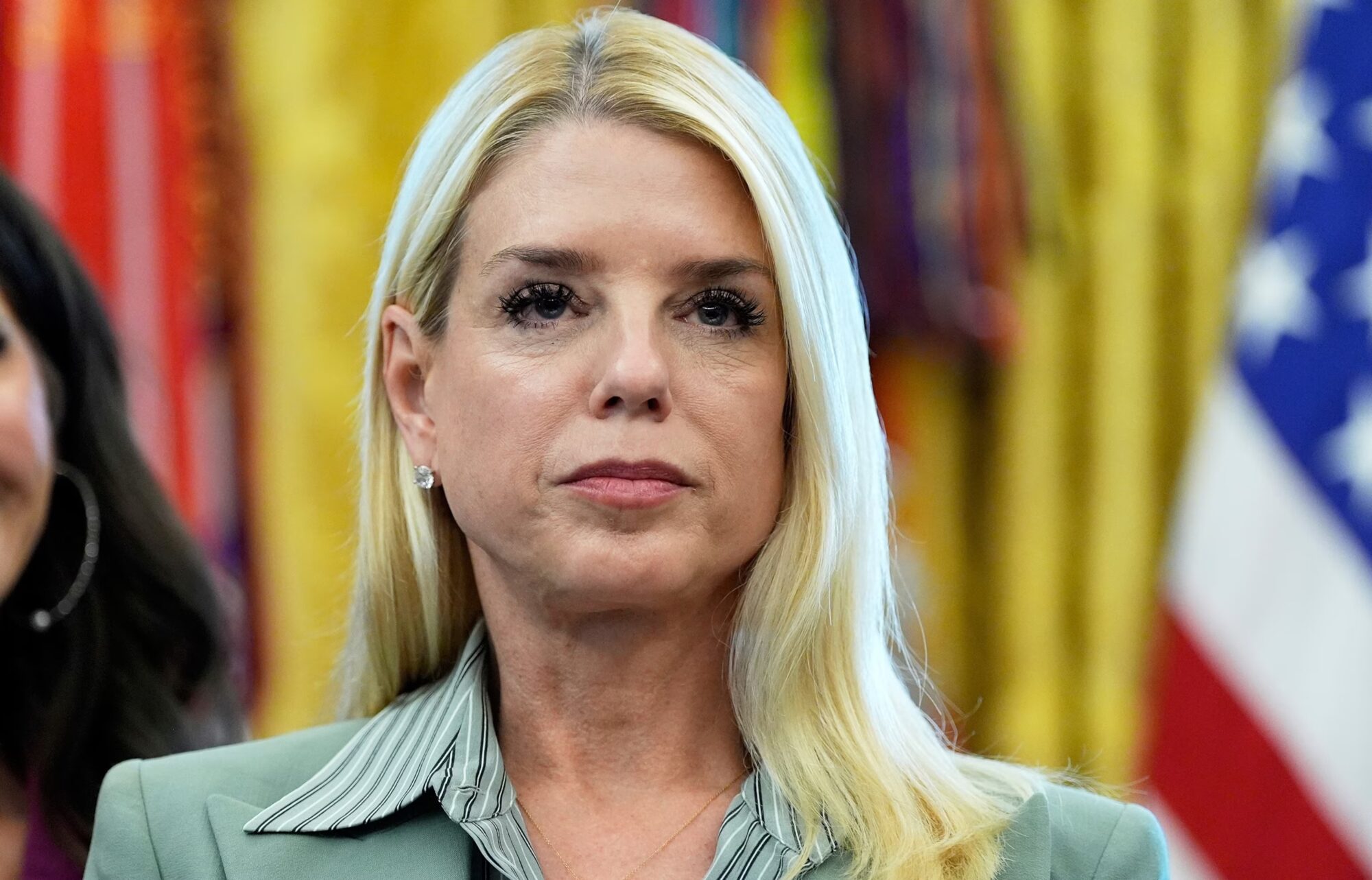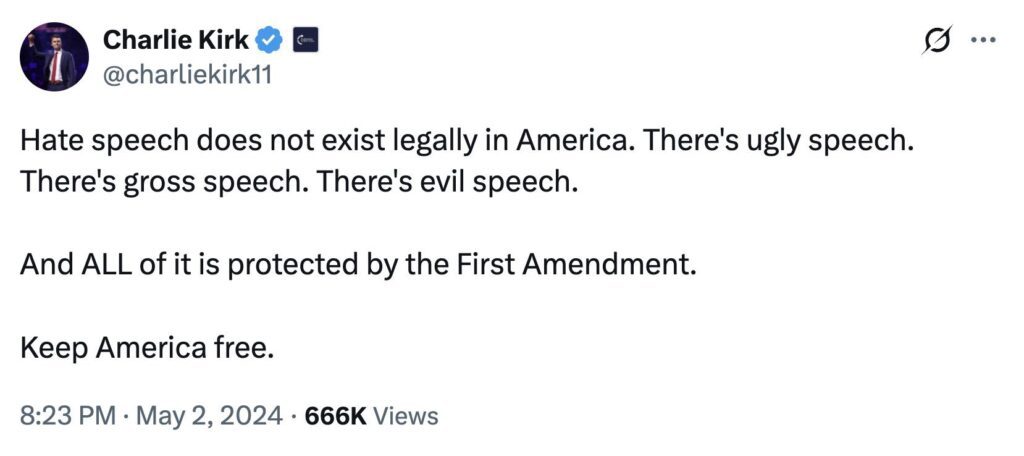
- A University of Mississippi employee loses her job and a Mississippi State student is no longer enrolled, after both post anti-Charlie Kirk rhetoric. Pam Bondi threatens to target “hate speech.” Could the crackdown go too far?
The University of Mississippi ended its relationship with Lauren Stokes, an employee, after she shared a social media post that compared Charlie Kirk to a member of the KKK and implied his death was warranted. The post drew national attention and created a firestorm.
Down the road in Starkville, a student posted a celebration of Kirk’s death on Instagram. That student is no longer enrolled at the university. Their Instagram account was deactivated. For fear of backlash, the Greek house they were associated with advised its other members to not wear apparel and to remove any paraphernalia that could identify them as fellow members. Unlike other prominent cases, this was handled quietly and sailed under the radar.
Thousands of similar cases popped up in the aftermath of Charlie Kirk’s death as social media echo chambers created a temptation for people who did not like what he stood for to celebrate his demise.
This trend of dehumanizing people who think differently than us is disturbing — apparently a sizable number of people never heard mama’s admonition that “if you don’t have something nice to say, don’t say anything at all.” It’s worth noting, though, that the overwhelming majority of people on both sides of the aisle appropriately expressed condolences. The jerks are outliers.
There’s no legal requirement, though, that people be polite. The First Amendment guarantees that the government will not infringe upon freedom of expression. This includes speech that others find distasteful or even repugnant. Indeed, the point of the amendment was to ensure that a majority could not silence an individual, and thus, deny them of that thing that makes us quintessentially free — our minds and our voice.
Not Free from Consequences
It’s become popular in recent days for people to say some variation of “you have freedom of speech, you don’t have freedom from consequences.” That’s partially true.
There are social consequences to violating norms of good behavior. Your girlfriend may leave you. Your neighbor may shun you. Your employer may fire you. And these consequences are often appropriate. They offer an organic regulation mechanism that helps to restore common decency.
Where it gets tricky, legally, is when the consequence of your free expression is exacted by government, itself. More often than not that runs afoul of the First Amendment. There are exceptions. You can’t threaten to kill or harm someone. The Supreme Court has carved out a narrow and limited exception for direct incitement of violence.
A government employer can terminate someone whose expression impedes their job performance or injures the operation of the “business.” Lauren Stokes departure from Ole Miss likely falls into this category, but largely, government cannot impose consequences that could be seen as viewpoint discrimination.
White House Goes Too Far
In recent days, members of the Trump administration have argued that anti-Kirk rhetoric on social media platforms could constitute “hate speech” that warrants prosecution. Appearing on a podcast, Attorney General Pam Bondi said, there’s “free speech and then there’s hate speech, and there is no place, especially now, especially after what happened to Charlie, in our society.” Bondi told the host the Trump administration “would absolutely target hate speech.”
Only, the Constitution carves out no exception to free speech protections for “hate speech.” It does not legally exist. The problems with the idea should be obvious. Someone has to determine what “hate speech” is — meaning the people in power. This turns the right of an individual to express themselves into the right of a majority to determine what can be expressed. It is anathema to our country’s designed core. It also runs afoul of long held conservative orthodoxy that there is no such thing as “hate speech” legally and that the left’s notion that “words can be violence” is bollix. Kirk, himself, fundamentally understood this:

Appearing later that night on television, Bondi explained that a business that refused to print fliers for a Charlie Kirk vigil could face government punishment for discrimination. “Businesses cannot discriminate,” Bondi said on Fox News. “If you want to go in and print posters with Charlie’s pictures on them for a vigil, you have to let them do that. We can prosecute you for that.”
Again, nothing could be further from the truth. Remember the Colorado cake baker who did not want to make cakes for gay weddings? Conservative lawyers fought for years, and the Supreme Court ultimately agreed, that he could not be forced to violate his conscious and endorse a viewpoint with which he disagreed.
Both of Bondi’s formulations are imbecilic. They evince a complete lack of legal knowledge on First Amendment precedent, and acted upon, represent a dangerous threat to a foundational right.
Woe to the people incapable of pondering how bad this kind of government intervention in speech could get and also who can’t contemplate how their political enemies might use that newfound power against them. People who agree with Bondi won’t always be in power. Today, the government prosecutes Kirk haters. Tomorrow, it prosecutes pastors for preaching traditional marriage.
Can and Should Are Two Different Things
Finally, a word on social consequences — those that don’t run afoul of the First Amendment. The right side of the political spectrum has railed for years against the left’s “cancel culture.” Now it has people scouring the internet and creating enemies lists for doxxing.
There’s no legal restraint on this behavior, but we have to decide if we want to live in a world where ruining people’s lives over dumb stuff they’ve said for blood sport is the norm. There’s too much glee in it for my taste. Free speech as a concept broader than the First Amendment is a cultural value — one where we recognize the worth of living in a society where people can express their ideas and create dialogue.
This is not to say that we can’t call out abhorrent behavior or even impose social consequences. It is to say that we should guard against going too far and check ourselves when feeding frenzies start.
In my estimation Ole Miss made the right decision parting with Stokes, for instance. Maintaining the relationship would damage its reputation and the function of the office she was in. But her family’s business certainly didn’t deserve bomb threats (and that’s criminal).
As to college students, there’s a reason I didn’t name the Mississippi State student. I think it’s qualitatively different. A few years ago, a student at the University of Tennessee lost their spot after video emerged of them saying the N-word in high school. I thought that was stupid then, not because it wasn’t wrong to use a racial slur, but because kids do dumb things. They should learn from them, not be ruined by them. I would prefer that person have remained enrolled and learned. Grace has got to be a part of the equation.
Line drawing in these circumstances is hard. It requires nuanced thought. But it’s better than the alternative of mob justice and pendulum swings that threatens rights and undermines the fabric of a free society.
Sticks and stones may break my bones, but words will never hurt me.










